
Nepenthes mirabilis, or the common swamp pitcher-plant and tropical pitcher plant, is a carnivorous plant species. By far the most widespread of all Nepenthes, its range covers continental Southeast Asia and all major islands of the Malay Archipelago, stretching from China in the north to Australia in the south. The species exhibits great variability throughout its range. One of the more notable varieties, N. mirabilis var. echinostoma, is endemic to Brunei and Sarawak and possesses an extremely wide peristome.

Nepenthes campanulata, the bell-shaped pitcher-plant, is a tropical pitcher plant native to Borneo. It has also been reported from Palawan, the Philippines, though further field work is needed to confirm this identification.

Nepenthes platychila is a tropical pitcher plant endemic to the Hose Mountains of central Sarawak. It is notable for its smooth peristome and funnel-shaped upper pitchers. Nepenthes platychila belongs to the loosely defined "N. maxima complex", which also includes, among other species, N. boschiana, N. chaniana, N. epiphytica, N. eymae, N. faizaliana, N. fusca, N. klossii, N. maxima, N. stenophylla, and N. vogelii.

Nepenthes philippinensis is a tropical pitcher plant endemic to the Philippines. It is known from Palawan and the neighbouring Calamian Islands and Linapacan, where it grows at 0–600 metres (2,000 ft) above sea level.

Nepenthes thorelii is a tropical pitcher plant endemic to Indochina. Very little is known about N. thorelii and it is unlikely to have entered cultivation, although various other taxa are often mislabelled as this species in the plant trade. Prior to its rediscovery in 2011, N. thorelii was considered possibly extinct, both in the wild and in cultivation.

Nepenthes paniculata is a tropical pitcher plant belonging to the genus Nepenthes.
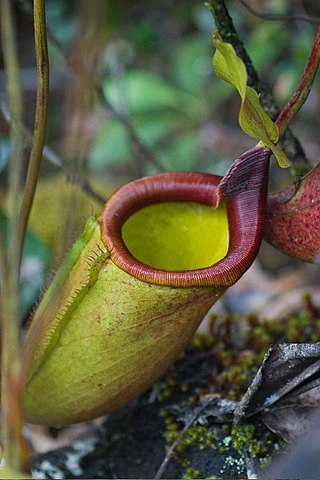
Nepenthes deaniana is a tropical pitcher plant endemic to the Philippines, where it grows at an altitude of 1180–1296 m above sea level. The species is known only from the summit region of Thumb Peak, a relatively small, ultramafic mountain in Puerto Princesa Province, Palawan.

Nepenthes smilesii is a tropical pitcher plant native to northeastern Thailand, southern Laos, Cambodia, and Vietnam. Nepenthes smilesii can tolerate an extended dry season and is most common in open, sandy savannah and grassland.
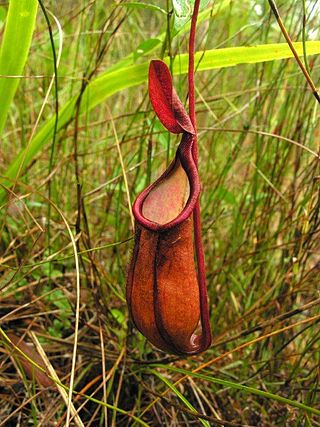
Nepenthes kampotiana is a tropical pitcher plant native to southern Cambodia, eastern Thailand, and at least southern coastal Vietnam. It has an altitudinal distribution of 0–600 m above sea level. The specific epithet kampotiana refers to the Cambodian city of Kampot, close to which the first specimens of this species were collected.
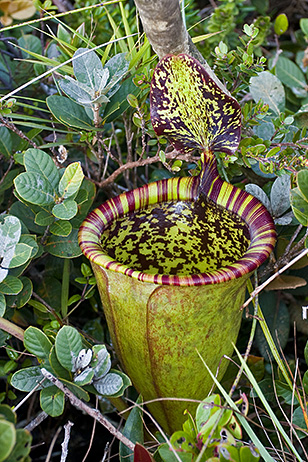
Nepenthes attenboroughii, or Attenborough's pitcher plant, is a montane species of carnivorous pitcher plant of the genus Nepenthes. It is named after the celebrated broadcaster and naturalist Sir David Attenborough, who is a keen enthusiast of the genus. The species is characterised by its large and distinctive bell-shaped lower and upper pitchers and narrow, upright lid. The type specimen of N. attenboroughii was collected on the summit of Mount Victoria, an ultramafic mountain in central Palawan, the Philippines.
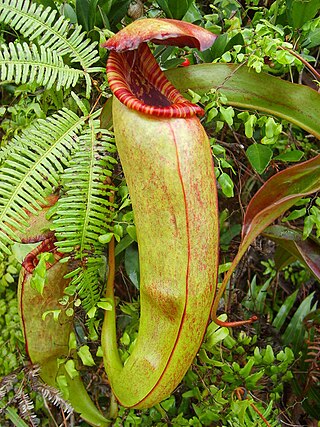
Nepenthes bokorensis is a tropical pitcher plant endemic to Cambodia. It is known from Mount Bokor in the south of the country, and an as yet undetermined specimen suggests that it may also be present in other parts of the Dâmrei Mountains of Kampot Province. The specific epithet bokorensis refers to both Mount Bokor and Bokor National Park.

Nepenthes kerrii is a tropical pitcher plant native to Tarutao National Marine Park in southern Thailand, where it grows at elevations of 400–500 m above sea level. The 2018 IUCN assessment also considers the taxon found on Langkawi Island of Malaysia to be conspecific. This species is thought to be most closely related to N. kongkandana. The specific epithet kerrii refers to Irish medical doctor Arthur Francis George Kerr, who made the first known herbarium collection of this species.

Alastair S. Robinson is a taxonomist and field botanist specialising in the carnivorous plant genus Nepenthes, for which he is regarded as a world authority. He is currently Manager Biodiversity Services at the National Herbarium of Victoria, Royal Botanic Gardens Melbourne, where he oversees identification botany services, the Library and Artwork components of the State Botanical Collection, and the botanical journal Muelleria, a peer-reviewed scientific journal on botany published by the Royal Botanic Gardens Victoria, for which he is Editor in Chief.
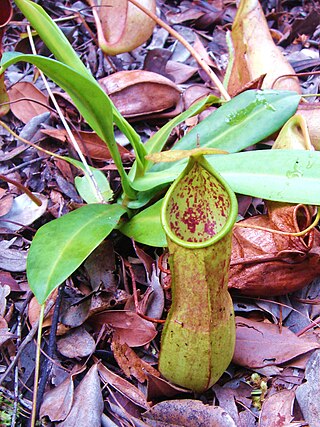
Nepenthes thai is a tropical pitcher plant endemic to peninsular Thailand. It grows on limestone hills at elevations of 500–600 m above sea level.
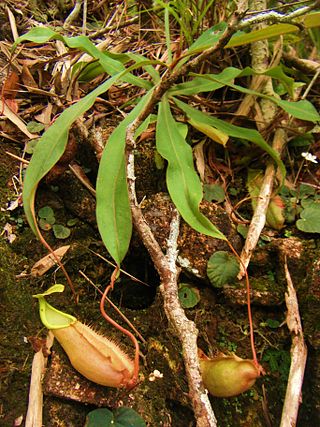
Nepenthes chang is a tropical pitcher plant endemic to the Banthad Mountains of central Thailand, where it grows at elevations of 300–600 m above sea level. It is thought to be most closely related to N. kampotiana.
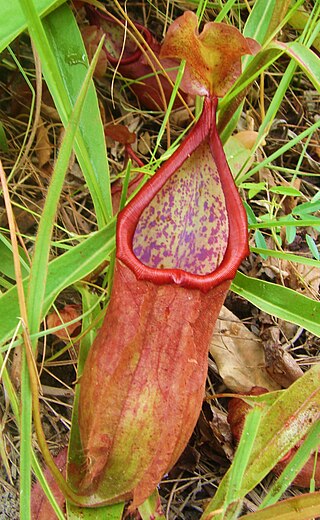
Nepenthes suratensis is a tropical pitcher plant endemic to Surat Thani Province, Thailand, where it grows near sea level in coastal savannah and grassland. It is thought to be most closely related to N. andamana.

New Nepenthes: Volume One is a reference work by Stewart McPherson on the pitcher plants of the genus Nepenthes. It was published in 2011 by Redfern Natural History Productions and focuses on discoveries made since the release of McPherson's 2009 monograph, Pitcher Plants of the Old World. The book was edited by Alastair Robinson.

















